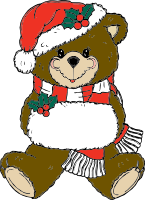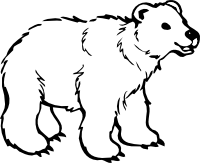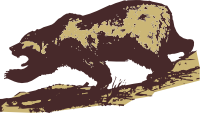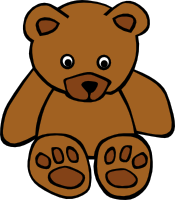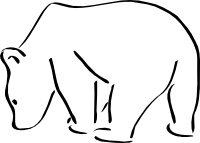Associations to the word «Bear»
Noun
- Resemblance
- Inflorescence
- Grudge
- Burden
- Fortitude
- Inscription
- Malice
- Similarity
- Testimony
- Likeness
- Tiding
- Effigy
- Stalk
- Yoke
- Witness
- Litter
- Fruit
- Blame
- Patience
- Imprint
- Appendage
- Affliction
- Centimeter
- Motto
- Emblem
- Semblance
- Teddy
- Flower
- Suffering
- Stamp
- Initial
- Sorrow
- Yogi
- Reproach
- Sable
- Scar
- Artemis
- Seal
- Name
- Hallmark
- Toil
- Stigma
- Coat
- Misfortune
- Weight
- Locality
- Grief
- Tick
- Baylor
- Oblast
- Misery
- Moose
- Panda
- Canton
- Lynx
- Breakout
- Elk
- Deer
- Boar
- Arthropod
- Paw
- Pathogen
- Cub
- Leopard
- Hms
- Cutler
- Reindeer
- Cougar
- Pooh
- Bison
- Packer
- Medallion
- Mosquito
- Otter
- Bryant
- Squirrel
- Steed
- Coyote
- Chicago
Adjective
Pictures for the word «Bear»
Wiktionary
BEAR, noun. A large omnivorous mammal, related to the dog and raccoon, having shaggy hair, a very small tail, and flat feet; a member of family Ursidae, particularly of subfamily Ursinae.
BEAR, noun. (figuratively) A rough, unmannerly, uncouth person. [1579]
BEAR, noun. (finance) An investor who sells commodities, securities, or futures in anticipation of a fall in prices. [1744]
BEAR, noun. (slang) (US) A state policeman (short for smokey bear). [1970s]
BEAR, noun. (slang) A large, hairy man, especially one who is homosexual. [1990]
BEAR, noun. (engineering) A portable punching machine.
BEAR, noun. (nautical) A block covered with coarse matting, used to scour the deck.
BEAR, verb. (finance) (transitive) To endeavour to depress the price of, or prices in.
BEAR, adjective. (finance) (investments) Characterized by declining prices in securities markets or by belief that the prices will fall.
BEAR, verb. (transitive) To support or sustain; to hold up.
BEAR, verb. (transitive) To carry something.
BEAR, verb. (transitive) To be equipped with (something).
BEAR, verb. (transitive) To wear or display.
BEAR, verb. (transitive) (with witness) To declare as testimony.
BEAR, verb. (transitive) To put up with something.
BEAR, verb. (transitive) To give birth to someone or something (may take the father of the direct object as an indirect object).
BEAR, verb. (ambitransitive) To produce or yield something, such as fruit or crops.
BEAR, verb. (intransitive) To be, or head, in a specific direction or azimuth (from somewhere).
BEAR, verb. (intransitive) To suffer, as in carrying a burden.
BEAR, verb. (intransitive) To endure with patience; to be patient.
BEAR, verb. To press; with on, upon, or against.
BEAR, verb. To take effect; to have influence or force.
BEAR, verb. To relate or refer; with on or upon.
BEAR, verb. To have a certain meaning, intent, or effect.
BEAR, verb. (transitive) (obsolete) To conduct; to bring (a person).
BEAR, verb. To possess and use (power, etc.); to exercise.
BEAR, verb. To possess mentally; to carry or hold in the mind; to entertain; to harbour.
BEAR, verb. (obsolete) To gain or win.
BEAR, verb. To sustain, or be answerable for (blame, expense, responsibility, etc.).
BEAR, verb. To carry on, or maintain; to have.
BEAR, verb. To admit or be capable of; to suffer or sustain without violence, injury, or change.
BEAR, verb. To manage, wield, or direct; to behave or conduct (oneself).
BEAR, verb. To afford; to be (something) to; to supply with.
BEAR, proper noun. A surname.
BEAR A HAND, verb. (nautical) (idiomatic) to make haste; to help quickly (used mostly in the imperative)
BEAR AWAY THE BELL, verb. To be superior in something.
BEAR CAT, noun. (obsolete) A red panda, Ailurus fulgens.
BEAR CATS, noun. Plural of bear cat
BEAR CLAW, noun. A large, sweet pastry filled with raisins and spices
BEAR CLAWS, noun. Plural of bear claw
BEAR CUB, noun. A young bear.
BEAR CUBS, noun. Plural of bear cub
BEAR DOWN, verb. Used other than as an idiom: see bear, down.
BEAR DOWN, verb. (nautical) To approach from windward.
BEAR DOWN, verb. (transitive) To push (someone) to the ground; to defeat, overcome. [from 14th c.]
BEAR DOWN, verb. (transitive) (obsolete) To maintain one's position against (someone) in a debate; to stand one's ground against. [16th-17th c.]
BEAR DOWN, verb. (intransitive) To intensify one's efforts.
BEAR DOWN, verb. (intransitive) (with on) To approach in a determined manner.
BEAR DOWN, verb. (intransitive) To exert downward pressure on one's abdomen, as in giving birth, forcing out feces, and some similar bodily maneuvers.
BEAR DOWN ON, verb. To approach someone in a very determined way.
BEAR FALSE WITNESS, verb. To give an untrue testimony. To lie
BEAR FLAG, proper noun. The flag raised at Sonoma in 1846 during the Bear Flag Revolt
BEAR FLAG, proper noun. The current flag of California, based on that flag.
BEAR FRUIT, verb. To succeed in some task; literally, of a tree or plant bearing fruit; figuratively in relation to any attempted task.
BEAR GARDEN, noun. (historical) A public place where bears are kept for diversion or fighting.
BEAR GARDEN, noun. (archaic) Any place where riotous conduct is common or permitted.
BEAR GARLIC, noun. A wild plant related to chives; ramsons, Allium ursinum
BEAR HUG, noun. Any especially large, tight or enthusiastic hug, usually friendly and especially between males.
BEAR HUG, noun. (business), a hostile takeover effort in which one firm offers to buy the other firm at a share price too high to refuse.
BEAR HUG, noun. (wrestling) a hold with the arms around the opponent.
BEAR HUGS, noun. Plural of bear hug
BEAR IN MIND, verb. (transitive) (idiomatic) To remember; to consider; to note.
BEAR IN UPON, verb. (literary) (rare) Induce somebody to realize something, to impress a realization upon a person, usually in a gradual way.
BEAR IN WITH, verb. (nautical) To approach (a ship) nearer.
BEAR LEADER, noun. (historical) One who leads about a performing bear for money.
BEAR LEADER, noun. (archaic) (humorous) (by extension) One who takes charge of a young man on his travels.
BEAR MARKET, noun. (finance) A stock market where a majority of investors are selling ("bears"), causing overall stock prices to drop.
BEAR MARKETS, noun. Plural of bear market
BEAR MEAT, noun. Meat from a bear
BEAR OFF, verb. To gain; to carry off, as a prize.
BEAR OFF, verb. To restrain; to keep from approaching.
BEAR OFF, verb. (nautical) To remove to a distance; to keep clear from rubbing against anything.
BEAR OFF FROM, verb. (nautical) To stand further off from (a ship)
BEAR ON, verb. To influence, have an effect on.
BEAR ON, verb. To be relevant to.
BEAR ONESELF, verb. (idiomatic) To behave and conduct oneself in such a manner that others will give one respect.
BEAR OUT, verb. (transitive) To corroborate, prove, or confirm; to demonstrate; to provide evidence for.
BEAR OUT, verb. To maintain and support to the end; to defend to the last.
BEAR PIT, noun. (slang) A question and answer forum with a group of politicians.
BEAR PIT, noun. A chaotic scene.
BEAR PITS, noun. Plural of bear pit
BEAR SPREAD, noun. (finance) One of a variety of strategies involving two or more options (or options combined with a position in the underlying stock) that can potentially profit from a fall in the price of the underlying stock.
BEAR STATE, proper noun. Arkansas
BEAR THE BELL, verb. To be the first or the leader.
BEAR THE BRUNT, verb. (idiomatic) To endure the worst part of something.
BEAR THE SCARS, verb. To live with emotional damage caused by past events that cannot be easily forgotten.
BEAR TRAP, noun. Alternative form of beartrap
BEAR TRAPS, noun. Plural of bear trap
BEAR UP, verb. (nautical) To sail close to the wind.
BEAR UP, verb. (idiomatic) (intransitive) To endure hardship cheerfully.
BEAR UP, verb. (idiomatic) (transitive) To support; to keep from falling or sinking.
BEAR UPON, verb. To influence, have an effect upon.
BEAR UPON, verb. To be relevant to.
BEAR WALKER, noun. (Native American) (folklore) An evil sorcerer, specifically one who walks by night in the form of a bear.
BEAR WITH, verb. (idiomatic) To be patient with.
BEAR WITNESS, verb. To deliver a testimony, especially as witness
BEAR WITNESS, verb. To prove, demonstrate
Dictionary definition
BEAR, noun. Massive plantigrade carnivorous or omnivorous mammals with long shaggy coats and strong claws.
BEAR, noun. An investor with a pessimistic market outlook; an investor who expects prices to fall and so sells now in order to buy later at a lower price.
BEAR, verb. Have; "bear a resemblance"; "bear a signature".
BEAR, verb. Cause to be born; "My wife had twins yesterday!".
BEAR, verb. Put up with something or somebody unpleasant; "I cannot bear his constant criticism"; "The new secretary had to endure a lot of unprofessional remarks"; "he learned to tolerate the heat"; "She stuck out two years in a miserable marriage".
BEAR, verb. Move while holding up or supporting; "Bear gifts"; "bear a heavy load"; "bear news"; "bearing orders".
BEAR, verb. Bring forth, "The apple tree bore delicious apples this year"; "The unidentified plant bore gorgeous flowers".
BEAR, verb. Take on as one's own the expenses or debts of another person; "I'll accept the charges"; "She agreed to bear the responsibility".
BEAR, verb. Contain or hold; have within; "The jar carries wine"; "The canteen holds fresh water"; "This can contains water".
BEAR, verb. Bring in; "interest-bearing accounts"; "How much does this savings certificate pay annually?".
BEAR, verb. Have on one's person; "He wore a red ribbon"; "bear a scar".
BEAR, verb. Behave in a certain manner; "She carried herself well"; "he bore himself with dignity"; "They conducted themselves well during these difficult times".
BEAR, verb. Have rightfully; of rights, titles, and offices; "She bears the title of Duchess"; "He held the governorship for almost a decade".
BEAR, verb. Support or hold in a certain manner; "She holds her head high"; "He carried himself upright".
BEAR, verb. Be pregnant with; "She is bearing his child"; "The are expecting another child in January"; "I am carrying his child".
Wise words
Words differently arranged have a different meaning, and
meanings differently arranged have different effects.

